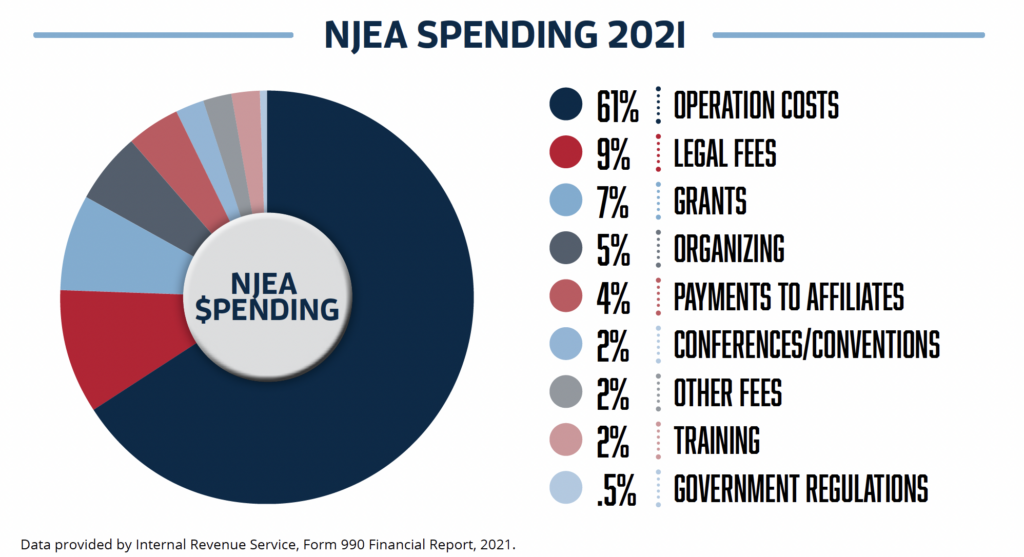The New Jersey Education Association (NJEA) represents roughly 200,000 education professionals in New Jersey. An affiliate of the National Education Association (NEA), NJEA describes itself as the “strongest public employee union in the nation.” Being an NJEA member comes at a steep price, with members paying roughly $1,000 in annual dues to the state affiliate alone. But how is the union spending these dues? Are membership dues being used to benefit members? As a non-profit, NJEA is required to file a Form 990 financial disclosure. A look at NJEA’s latest financial disclosure, covering the 2021 fiscal year, can help answer these questions.
NJEA’s latest Form 990 shows that operating the union accounted for a significant portion of NJEA’s expenses. During the 2021 fiscal year, NJEA spent $83.1 million, or 60.6 percent of all expenses, on operational costs, including line items such as employee salaries, employee benefits, employee travel, and office expenses.
Employee compensation made up most of these costs, totaling $70.6 million. NJEA President Sean Spiller earned
$291,289 in 2021, about 4.5 times the amount of the average New Jersey public school teacher. Executive Director Steve Swetsky was the NJEA’s top earning employee, bringing in $411,864 in 2021, almost 6.5 times as much as the average public school teacher. Outside of operation and staff costs, organizing — the spending category most closely tied to membership representation — only accounted for $6.9 million, or 5.1 percent of all expenditures. Additionally, NJEA spent $12.3 million on legal fees and $10.1 million on grants to other organizations. In total, NJEA spent $137.1 million in 2021. The union took in roughly $25 million more than it spent, with NJEA’s revenue reaching $162.7 million. Most of NJEA’s revenue came from membership dues, accounting for 84 percent of all revenue. Other revenue sources for the union include investments (10.7 percent) and grants (4.5 percent). By keeping spending lower than revenue, NJEA has managed to build a strong financial position. In total, NJEA holds over $244.5 million in assets and just $62.3 million in liabilities. Since 2019 the union’s net financial position has increased by over $171.4 million.

NJEA’S MEMBER DUES PAY FOR POLITICS
On its surface, NJEA’s Form 990 does not seem to indicate that NJEA is very involved in politics. According to federal law, member dues can be used for a variety of political activities, such as issue advocacy, get-out-thevote drives, election mailers, lobbying, and public marketing campaigns. The Janus v. AFSCME U.S. Supreme Court decision relieves nonmembers from the obligation to pay any dues or fees to the union as a condition of public employment. However, for teachers who remain NJEA members, Janus changes nothing about how union dues are spent: they are still routinely used for political purposes.

NJEA’s Form 990 shows that the union spent just $414,347 of members’ dues on public affairs and government relations and transferred $799,621 to NJEA’s political action committee (PAC). However, a closer examination shows that the union used $6 million in membership dues to make a “grant” to Garden State Forward, NJEA’s independent expenditure committee (IEC). As an IEC, Garden State Forward can give unlimited amounts of money to other political committees. In 2023, Garden State Forward was the fourth-biggest spending political committee in New Jersey. Most of Garden State Forward’s went to political committees that supported Democrats.
As noted, the NJEA also has a PAC that is separate from Garden State Forward. This PAC, named the NJEA PAC, is funded by members. To pressure members into making PAC contributions, NJEA’s website lists 10 rebuttals to common reasons members give for not making PAC contributions.
NJEA PAC spent over $1 million supporting candidates for elected office in New Jersey during the 2021–22 election cycle. Of this, about 86 percent went to Democrats, 8 percent went to Republicans, and 6 percent went to nonpartisan candidates or organizations.
New Jersey Education Association members also pay dues to the National Education Association. For more information on how those dues are spent, see: